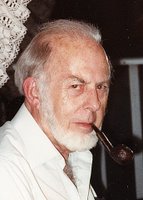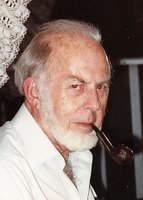Ross H. Spencer - A Writer's Writer
 Eight years have gone by since my friend Spence shut down his word processor for the last time and began The Big Sleep. He was a husky man, Ross H. Spencer, with the weatherbeaten face of a man who'd been around the block more than a few times.
Eight years have gone by since my friend Spence shut down his word processor for the last time and began The Big Sleep. He was a husky man, Ross H. Spencer, with the weatherbeaten face of a man who'd been around the block more than a few times.Some of that came from growing up and maturing in Youngstown, one of those Industrial Valley cities where men worked hard for a living, drank hard to forget those long days in the steel mills, played hard because they didn't know any other way of going about things. It was the same from Cleveland to Pittsburgh and down along the Ohio River to Wheeling. In Akron, my hometown, the only difference was they worked in rubber factories instead of steel mills. Tough jobs for tough men.
Spence enjoyed spending some of his leisure time in the Ohio National Guard. Then along came a war and Spence and his buddies found themselves fighting in the South Pacific, islands called Guadalcanal, Bougainville, New Georgia. He was awarded a Bronze Star medal.
After getting out, Spence decided to live in Chicago so he'd be close by when his beloved Cubs won all those pennants he was sure they'd win. When he headed back to Youngstown forty years later he was still waiting for that first one. In Chicago he was a railroad man on the Milwaukee Road. He met a girl named Shirley and she became his lifelong companion.
Spence read a lot, a couple of books a week or more, so one day Shirley came home with a mystery for him, a book about a character names Spenser. Spelled differently, pronounced the same. Spence read it and decided he could write one just as good as Robert Parker's. Over the years a lot of people came to agree with him.
Spence had a couple of dozen books published by the top names in the business. All but one, a kid's book, were mysteries and all contained a great deal of wry humor. So the name Ross H. Spencer was big among writers in the mystery field, but he never made much money from writing. We never discussed dollar figures, but I'd bet he made more in a couple of years on the Milwaukee Road than he did from all those books combined. That's the way it goes for most writers.
No one ever left Spence's house with a thirst. His bar was as well stocked as any in town. It was in a finished basement where he did his writing. There was a model railroad, too. The Milwaukee Road, of course. And a computer football game. He would have loved those of today with their colorful graphics. There usually was music in that basement. He could play just about anything depending upon his mood, big band, jazz, polka, country, classical, everything but rock 'n' roll. That wasn't music, he said, it was sound. He could sit there telling stories by the hour, a beer or something stronger in his hand, a fat cigar in his mouth. Most of all, though, he enjoyed listening to the stories others had to tell.
I never read anything that Spence wrote that I didn't enjoy. Stories about characters with names like Itchy Balzano and a minor league baseball team called the No Sox. But the thing that impressed me the most was the dedication to one of his books:
"To the dreams I have lost and will never retrieve,
To the jungle of thoughts where I hid.
To all of the people who didn't believe,
And to Shirley R. Spencer, who did."
It says a lot about the man, or at least it does to me. Then there was the inscription he wrote on a book he gave me: "To Dick, bird of my own feather - (a sitting duck, probably) - Spence."
I think he was right about that.
A good man, Ross H. Spencer. Look him up on Amazon sometime. Shell out a few bucks for one of his books because some of them are still listed there. You won't be disappointed.
Visit my websites:
www.dickstodghill.com
www.infantrycombat-normandy.com








